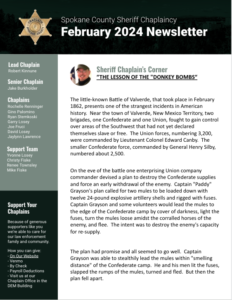 THE LESSON OF THE “DONKEY BOMBS“
THE LESSON OF THE “DONKEY BOMBS“
The little-known Battle of Valverde, that took place in February 1862, presents one of the strangest incidents in American history. Near the town of Valverde, New Mexico Territory, two brigades, one Confederate and one Union, fought to gain control over areas of the Southwest that had not yet declared themselves slave or free. The Union forces, numbering 3,200, were commanded by Lieutenant Colonel Edward Canby. The smaller Confederate force, commanded by General Henry Silby, numbered about 2,500.
On the eve of the battle one enterprising Union company commander devised a plan to destroy the Confederate supplies and force an early withdrawal of the enemy. Captain “Paddy” Grayson’s plan called for two mules to be loaded down with twelve 24-pound explosive artillery shells and rigged with fuses. Captain Grayson and some volunteers would lead the mules to the edge of the Confederate camp by cover of darkness, light the fuses, turn the mules loose amidst the corralled horses of the enemy, and flee. The intent was to destroy the enemy’s capacity for re-supply.
The plan had promise and all seemed to go well. Captain Grayson was able to stealthily lead the mules within “smelling distance” of the Confederate camp. He and his men lit the fuses, slapped the rumps of the mules, turned and fled. But then the plan fell apart.
When the mules looked back and saw their masters returning to the Union camp, they turned to follow. The men were horrified to see the “donkey bombs” heading straight for them. Grayson and his men began to run, but the mules easily gained on them. Unfortunately, the men had removed their boots to reduce noise and the risk of detection. As the mules got closer, the desperate Union soldiers had to run barefoot through prickly pear cactus and yucca patches to escape. Suddenly, a thunderous blast showered the men with artillery fragments and bits of the animals. However, the men survived but limped back to camp thoroughly footsore.
The image of those “donkey bombs” returning to their senders illustrates one of God’s laws among humankind. It is the law of recompense. This law ensures that what we send forth to others will return to us. What we deal out to others will be dealt out to us. “Whatsoever a man soweth, that shall he also reap.” (Galatians 6:7) “Judge not, lest you be judged. For with what judgment you judge, you will be judged.” (Matthew 7:1-2)
But this law also works for the good that we do to others. “Give and it shall be given unto you.” (Luke 6:38) “Cast your bread upon the waters, and you shall find it after many days.” (Ecclesiastes 11:1) “Blessed are the merciful, for they shall obtain mercy.” (Matthew 5:7) The way we treat our fellow human beings is a matter near and dear to God’s heart. The Scripture tells us that we cannot hate our brothers and sisters whom we have seen and love God whom we have not (1 John 4:20-21). God will not even accept our worship when we are at odds with our brothers and sisters (Matthew 5:23-24). Other philosophies and religions may allow its adherents to have a scapegoat, an enemy upon which to vent their hatred. But the Gospel of Jesus Christ commands us to love our enemies, to bless those that curse us, to do good to those that hate us, and to pray for those who abuse us (Matthew 5:44).
But never fear. God assures us that loving and doing good to our enemies is not the path to our own destruction. It is the only way of survival and happiness in this life, and glory in the life to come.
PRAYER from Ch David Causey: Dear Father in heaven, we are so quick to retaliate and return evil for evil. Remind us of the humility and love of Jesus, Who endured much at the hands of those who hated Him. Please remind each one of us also that whatever we deal out to others, good or bad, will ultimately return to us. In the Name Above every name, Jesus, we pray. Amen.
Blessings from Above, Ch Robert Kinnune
